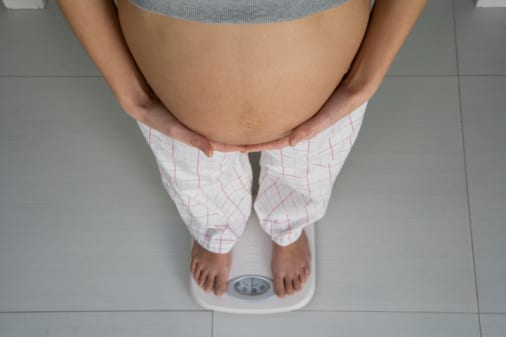Your doctor expects you to gain 25 to 37 lbs. during your pregnancy, if you were at an average weight when you conceived, according to the American Pregnancy Association (APA). Gaining within your doctor’s guidelines will help your baby develop normally during the pregnancy. While weight gain is expected and desired during your pregnancy, your body will react to the extra weight in several ways.
Gestational Diabetes
One risk of gaining too much weight during your pregnancy is gestational diabetes. You will be tested for gestational diabetes during your pregnancy and, if you have it, you will be placed on a special diet and moved to a high-risk pregnancy physician for the remainder of your term. Gestational diabetes can cause you to have a larger-than-average baby, which may create the need for a Cesarean section delivery.
Elevated Blood Pressure
Another effect of weight gain during pregnancy can be an elevation in blood pressure. Signs of hypertension include headaches, blurred vision and swelling of extremities. Taking steps to maintain appropriate weight gain during pregnancy helps reduce your risk of developing hypertension during your pregnancy.
Backaches
The weight you gain while pregnant may put increased pressure on your lower back and produce backaches. This is caused by the increased pull from your abdomen as the baby grows and develops. Weight in excess of the recommended amount can exacerbate this problem. Make sure you get enough rest. Take regular walks, and maintain a healthy weight.
Varicose Veins
Unsightly purple varicose veins are a typical byproduct of pregnancy weight gain. These veins commonly appear on the upper portion of your legs as your body adjusts to the added weight of the baby. Sitting for long hours, without breaks, can also contribute to the development of this condition. Making sure to take frequent breaks from sitting can also help you reduce your risk of developing varicose veins.
Fatigue
A common complaint among pregnant women is fatigue, especially during the first and third trimesters. Your weight gain contributes to this fatigue. Making sure you are drinking enough water, taking short naps and getting light exercise can all help alleviate your feelings of exhaustion.





